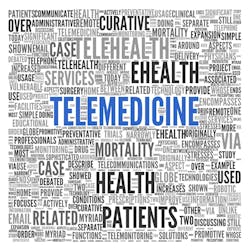The volume of telehealth visits within provider organizations has surged across the U.S., and a new CHIME survey finds that since the onset of COVID-19, 84 percent of organizations have been conducting more than 50 visits per day, with a full one-third of those scheduling over 250 visits per day.
According to officials at the Ann Arbor, Mich.-based College of Healthcare Information Management Executives (CHIME), “Telehealth has been a resounding success as healthcare organizations quickly implemented solutions to remotely care for patients during the COVID-19 pandemic.” This narrative was only emphasized in a recent survey of nearly 200 digital healthcare executives conducted by CHIME. Telehealth’s rapid implementation is testament to the skills and resourcefulness of these organizations’ IT leadership, who shared insights on their greatest gains, challenges and future needs, the association’s officials stated.
The survey revealed huge increases for virtual visits and appointments. Of the organizations surveyed, 73 percent had conducted less than 25 virtual visits per day prior to COVID-19. Once the epidemic began, 84 percent of organizations were conducting more than 50 visits per day and a full one-third of those were scheduling over 250 visits per day. Even organizations that already had been seeing high volumes of patients virtually prior to COVID-19 experienced a 366 percent increase in the number of virtual visits. Organizations also reported a pre vs. post COVID-19 hike in the use of remote patient monitoring, the data showed.
Many respondents listed the swift deployment and implementation of telehealth and virtual visits – some within mere days or a week – as their greatest success. Many noted quick adoption by clinicians and physicians as a win, along with physician and patient satisfaction with the ability to safely provide and get remote care.
Over the past several weeks, Healthcare Innovation has highlighted the telehealth progress experienced in various health systems in the face of COVID-19, with MedStar Health, Stanford Children’s Health, and Augusta University Health representing just a few examples.
Meanwhile, according to the CHIME survey, limited supplies of high-demand technology, integration issues, patients’ lack of resources like broadband and unfamiliarity with the technology posed challenges, but many organizations found ways to surmount these obstacles. Based on their experience handling COVID-19, almost 80 percent suggested that telehealth would require more future funding and more than 60 percent supported more funding for remote monitoring.
“Our members and their teams have worked tirelessly to help protect their patients, clinicians and communities from COVID-19,” CHIME President and CEO Russell Branzell said in a statement. “They have been extremely innovative, using existing and new technologies, partnerships and the knowledge of their peers to respond to this unprecedented crisis. They have shown the world how resilient they are, and how amazingly nimble they can be, when faced with adversity.”
What’s more, the federal government has allowed regulatory flexibilities during the public health emergency, a move that some respondents praised and wanted continued. This has included loosening several restrictions around telehealth licensing, while also increasing reimbursement for providers. “Our members greatly appreciate efforts by the administration, Congress and federal agencies to reduce the strain that COVID-19 has placed on their healthcare organizations,” said CHIME Public Policy Vice President Mari Savickis. “The flexibilities have allowed members to expand virtual care at a critical time. Given the great success we’ve seen, we’d like many of those flexibilities to be made permanent.”
Separately, in a June 15 news release, the Department of Veterans Affairs (VA) announced that telehealth video appointments using VA Video Connect increased from approximately 10,000 to 120,000 appointments a week between February and May of 2020. This increase of 1,000 percent is attributed to VA providers and veterans taking precautions against COVID-19, officials said. VA Video Connect allows Veterans and their caregivers to meet virtually with their VA care teams on any computer, tablet, or mobile device with an Internet connection, officials contend. The platform enables more than 25,000 virtual appointments, including mental health appointments each day.
Further, when asked in the survey how concerned members are with meeting upcoming federal deadlines on information blocking, more than 45 percent were extremely or very concerned, and 25 percent were concerned. About 7 percent said they hadn’t had time to learn about the deadlines because they were devoting their attention to the COVID-19 pandemic. Earlier this year, the U.S. Department of Health and Human Services extended the compliance deadline for the Office of the National Coordinator for Health IT’s information blocking provisions to Nov. 2. “We’re following this closely and working to make sure our members are fully informed,” Savickis said.


